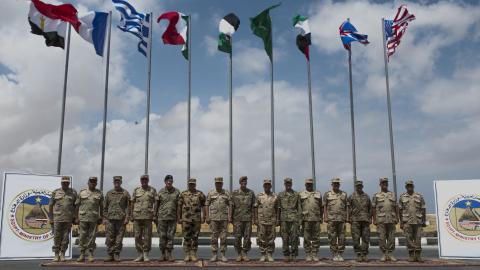China and Russia are exploiting US indifference toward the Middle East and efforts to integrate Iran into the region, threatening regional stability, Israel’s security, and global markets.
The convergence of threats encompasses an Iranian nuclear threshold state controlling a constellation of terrorist groups, resurgent non-state terrorist groups including ISIS and al-Qaeda, and Russian and Chinese exploitation of receding American presence. We are reaching an inflection point at which the United States risks the irrevocable loss of a favorable balance of both trade and forces, resulting in instability that will threaten our vital interests and the global economy. This constitutes an unprecedented range of challenges beyond our capacity, and the capacity of our partners and allies, to address threats to global energy and trade as we struggle to recover from a global pandemic. We have not faced a similar period of risk in the Middle East since the turmoil following the Iranian Revolution, Soviet invasion of Afghanistan, and storming of the Grand Mosque in 1979.
The US shares vital national security interests with longtime partners in the region and, as a result, they prefer US leadership in both the economic and security domains.
A sustainable US-led regional security construct in the Middle East that includes effective partners based on convergent interests is the most efficient way to address the unacceptable risk, which results from the disconnect between the vital national interests of the US and its partners and the resources both have committed. A constellation of mutually beneficial trade relationships providing both the resources and rationale for a regional security construct would strengthen such an arrangement.1
Establishing a US-led enduring regional security architecture comprised of more capable partners and allies is the most effective way for the United States to safeguard our vital national security interests in the Middle East. This architecture would provide five key benefits:
- Secure our vital interests. The US and global economies depend on the uninterrupted flow of energy from and trade through the Middle East, which remains a vital national security interest.
- Compete with China. China depends on the Middle East for energy to sustain its economy and military. Beijing is exploiting the vacuum created by US indifference to securing the Middle East.
- Manage risk and uncertainty. Threats in the region are approaching a quantitative military advantage over America’s partners, which creates unacceptable risk to US interests.
- Leverage our relationships. We retain advantages in the long-term diplomatic, economic, and security relationships that we have derived from convergent interests with partners.
- Build on a sound foundation. Historic efforts to build collective security constructs, many of which have occurred within the Middle East, provide valuable lessons.















